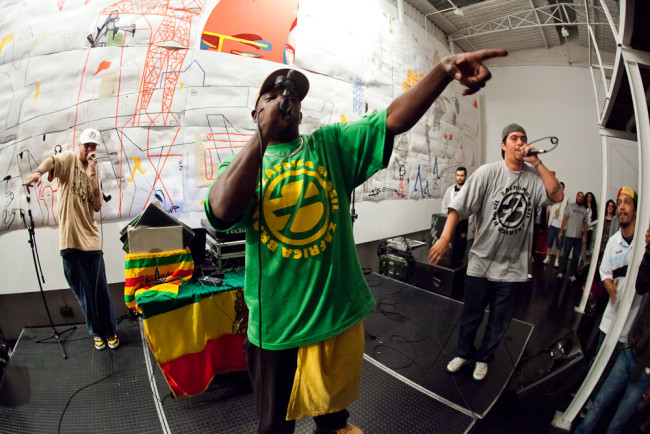We’re not Monkeys or Panthers
The rap music of Z'Africa Brasil -- composed of rappers Gaspar and Funk Biu, DJ Tano and producer Pitchô.

Wiki Commons.
Race in Brazil has never been simple. In the midst of the protests leading up to the 2014 World Cup, all eyes turned to Brazilian soccer players as yet another object lesson in blackness, racism and Africanity in the former Portuguese colony. The polemical fallout under the banner “We are all monkeys,” which emerged from the viral clip of Daniel Alves, the Barcelona FC eating a banana a Spanish fan had thrown at him, demonstrates the complexity of race and persistence of racism in the country that prides itself on being a “racial democracy.” What about the vanguard of another segment of popular culture, Brazilian rappers? Do these masters of the word, street and idea have anything to contribute?
“Back in the day, quilombos, today periphery,” “Periafricana Brasileiroz” and “Black Eldorado.” These are just some of the Afro-Brazilian neologisms of Gaspar, rapper and leader of an enigmatic group called Z’Africa Brasil. The “Z”s refer to Zumbi, the legendary 17th century warrior of the Palmares quilombo, one of the hundreds of maroon, Afro-Indigenous communities established during Portuguese colonialism. Quilombos continue to be a source of political tension and cultural expression. Z’Africa Brasil is composed of rappers Gaspar and Funk Biu, DJ Tano and producer Pitchô. The group’s name also refers to the famous 1976 album of Brazilian soul star Jorge Ben Jor, “Africa Brasil.” Finally, Z’Africa is a salve to the pioneer DJ of São Paulo’s baile black era during the 1970s and 80s, when sound system crews mixed James Brown and Parliament with Brazilian funk, soul and samba-rock stars, such as Gerson King Combo, Trio Mocotó and Black Rio, along with Afro-pop icons Fela Kuti and Miriam Makeba.
As the phrase, “Black Eldorado” indicates, Gaspar enjoys juxtaposition, in this case between the generative culture of blackness and the colonial Latin American myth of endless riches. He continually provokes his audience that one can be militant about Africanity and embrace crossover. At a certain level, Gaspar, a nickname that refers, in part, to his light, “ghostly” skin color, needs to preach crossover. But, his philosophy is more complicated than convenience. Z’Africa Brasil’s negritude moves away from strategic essentialism of the pantherism of MNU (Unified Black Movement) and pitches blackness as mixture, always from the perspective of the poor, working-class suburbs called “periferia.”
For Gaspar, all humanity begins with Africanity, which he interprets as a truth based in the encounter. The encounter bridges difference and is motivated by the escambo, the deal or barter. On Z’Africa’s most recent album “Rapsicordélico” (2014), a neologism composed of “rap,” the Northeastern folk literature of “cordel,” and “psycholdelic,” Gaspar raps, “I come from the mocambo to make a deal (escambo). When the police comes, I switch it up and return to the quilombo.” (Mocambo and quilombo are synonymous with the former from the Umbundu language and the latter from Kimbundu.)
While the great majority of Brazilian rappers have tried to distance themselves from national popular music and folklore, Gaspar has always considered rap as part of a something larger. His father was born in Ceará, a large, poor state in the Northeast, and was a sanfoneiro (accordionist) in various forró musical groups before and after migrating south to the fundão, the way down periphery neighborhood of Capão Redondo in the mega-city of São Paulo. Gaspar explained that his upbringing with such strong roots in not only forró but also coco, baião, maracatu, embolada along with the handcraft literature of cordel impressed upon him that hip hop had to include more than just timbres of boom boom pa and straight ahead 4/4 time signatures. “Rap is one kind of canto, a manner of creating lyrics and exchanging ideas. This is where the beauty of Brazil, the northeast, Afro, and indigenous beats come in. I am more than just a rapper. All of this is me.”
Until recently, Z’Africa’s style of hip hop and Africanity found greater appreciation among rappers and folk musicians from France, Italy, England, the US and Burkina Faso than with the orthodox Brazilian rap market. Z’Africa has found a musical alternative to racist/racial democracy monkeys and myopic black panthers. The encounter of the quilombo is the key.As Brazil’s hip hop scene matures and new spaces for multiple Africanities emerge in global pop culture, Z’Africa Brasil perhaps is on the brink of new audiences and a deserved recognition of being ahead of the curve.



















